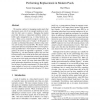Free Online Productivity Tools
i2Speak
i2Symbol
i2OCR
iTex2Img
iWeb2Print
iWeb2Shot
i2Type
iPdf2Split
iPdf2Merge
i2Bopomofo
i2Arabic
i2Style
i2Image
i2PDF
iLatex2Rtf
Sci2ools
107
click to vote
USENIX
2000
2000
Performing Replacement in Modem Pools
We examine a policy for managing modem pools that disconnects users only if not enough modems are available for other users to connect. Managing the modem pool then becomes a replacement problem, similar to buffer cache management (e.g., in virtual memory systems). When a new connection request is received, the system needs to find a user to "replace". In this paper we examine such demand-disconnect schemes using extensive activity data from actual ISPs. We discuss various replacement policies and propose CIRG: a novel replacement algorithm that is well suited for modem pools. In general, the choice of algorithm is significant. A naive algorithm (e.g., one that randomly replaces any user who has been inactive for a while) incurs many tens of percent more "faults" (i.e., disconnections of users who are likely to want to be active again soon) than the LRU algorithm, which, in turn, incurs 10% more faults than CIRG. For good replacement algorithms, the impact can be s...
Modem Pools | Operating System | Replacement Algorithms | USENIX 2000 | Various Replacement Policies |
Related Content
| Added | 01 Nov 2010 |
| Updated | 01 Nov 2010 |
| Type | Conference |
| Year | 2000 |
| Where | USENIX |
| Authors | Yannis Smaragdakis, Paul R. Wilson |
Comments (0)

